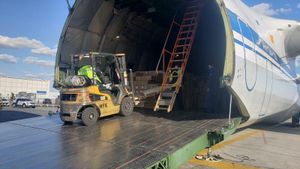Ukraine is set to receive a significant boost to its finances as the European Union has announced a new aid package of €3.5 billion. This announcement, made by Ursula von der Leyen, the President of the European Commission, took place during the Support Ukraine summit held on February 24, 2025, marking the three-year anniversary of Russia's full-scale invasion.
During her visit to Kiev, von der Leyen emphasized, "Europe stands with Ukraine because the fate of Europe is at stake." With this new tranche, the EU aims to cover the substantial budget deficit faced by Ukraine, which has been exacerbated by the prolonged conflict with Russia. Von der Leyen stated, "We have covered Ukraine's budget deficit for the entire year of 2025," highlighting the EU's commitment to support the war-torn nation through various financial mechanisms, including the G7 loans and the Ukraine Facility, which is part of the broader assistance strategy.
The financial package is seen as part of the EU's longstanding support for Ukraine, totaling around €134 billion since the start of the conflict. This funding has not only been aimed at humanitarian and economic assistance but also at bolstering Ukraine's military capacity. Amid growing concerns over Russia's intentions, von der Leyen remarked on the gravity of the situation, stating, "The war in Ukraine remains the most important and decisive crisis for the future of Europe." She underscored the importance of unified support against Russian aggression, presenting the aid as not just beneficial for Ukraine but also as integral to the stability of the entire European continent.
Beyond immediate financial support, the upcoming years will see the EU and its member states striving to integrate Ukraine's energy market with the EU's infrastructure. Von der Leyen promised additional efforts to secure Ukraine's energy security, stating, “We are preparing an ambitious package for energy security,” aiming to mitigate the effects of Russia’s continuous attacks on Ukraine's energy infrastructure. Current efforts have already facilitated the supply of 1.8 gigawatts to help Ukraine through the winter.
Attendees of the summit also included Antonio Costa, President of the European Council, along with thirteen heads of state and government leaders from other European nations and Canada, reinforcing international solidarity. Costa’s participation emphasized the EU's stance of unwavering support, as he noted, "We have been alongside you since day one." This unity was evident as leaders gathered not only to reaffirm their commitment to Ukraine but also to share strategies to navigate the challenges posed by Russian advances.
Further discussions will continue, particularly with another summit scheduled for March 6, where EU leaders are expected to agree on new military support initiatives. Kaja Kallas, the EU's chief diplomat, pushed for commitment from the 27 member states to expedite the provision of military aid to Ukraine to reinforce its defense capabilities against Russian military actions.
This planned military assistance has become increasingly urgent as negotiations between the United States and Russia raise concerns among European allies about the potential risks of a hasty peace agreement. Europe's apprehension underlines the complexity of the geopolitical environment, and von der Leyen's continued presence and dialogue with Ukraine exemplify the EU's proactive approach.
Von der Leyen characterized the situation succinctly: "This is not just about the fate of Ukraine but the fate of Europe. It is imperative we continue to strengthen Ukraine during this pivotal moment." Her sentiments reflect not only the humanitarian aspect of the crisis but also the pressing geopolitical significance of supporting Ukraine against external threats.
With the €3.5 billion aid package set for release soon, the EU is solidifying its role as Ukraine’s foremost ally amid rising tensions and the imposing shadow of Russian militarism. Continued unity among European nations, aligned with strategic financial and military support for Ukraine, has never been more important for maintaining regional stability and ensuring the defense of democratic values against aggression.



